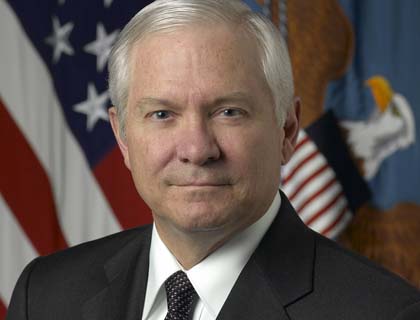KANDAHAR - The gradual withdrawal of U.S. combat troops from Afghanistan set to begin next month will be done responsibly and will not expose other coalition and Afghan forces to undue risks, Defense Secretary Robert Gates said on Sunday.
General David Petraeus, commander of the 150,000 foreign troops in Afghanistan, will soon make recommendations to President Barack Obama about how many should be withdrawn, following Obama's pledge last year to start bringing U.S. combat troops home.
The commitment followed Obama's December 2009 decision to send 30,000 extra U.S. troops in a bid to arrest a growing Taliban-led insurgency. Fighting increased dramatically, particularly in the Taliban heartland in the south, since the last of those extra troops arrived last summer.
U.S. commanders say significant gains have been made in halting the Taliban's momentum in the south since then, but violence has flared elsewhere in Afghanistan, particularly in the east and with complex attacks in major cities.
Pentagon and White House officials are tight-lipped about the size of the initial withdrawal. Obama is expected to announce his decision sometime in mid-July.
Gates said great strides had been made in training enough Afghan police and soldiers adequately to allow for the gradual withdrawal that will end with all foreign combat troops leaving by the end of 2014, according to an agreement reached at a NATO summit last December.
"And so the question then becomes, what can you take out and what is the risk associated with that," Gates said at a forward operating base in southern Kandahar province, the birthplace of the Taliban.
"And I think General Petraeus will come in with a range of options. And I have every confidence that the decision that's made will be a responsible one," he told troops at the base just outside Kandahar city.
"LEAVE THE SHOOTERS TO LAST"
At the start of this year, with violence raging across Afghanistan after nearly a decade of war, an initial pullout of around 5,000 troops had been anticipated.
With U.S. commanders now trumpeting the success of their offensives in the south, some current and former officials say Obama could announce a pullout of at least 10,000.
Some U.S. lawmakers and analysts, however, have questioned the wisdom of bringing out any troops at all so soon after security gains were made and with doubts lingering about poorly equipped and minimally trained Afghan security forces.
Asked about the drawdown by a soldier at the Kandahar base, Gates said discussions would likely begin when he returned from his current trip, his 12th and final visit to Afghanistan as head of the Pentagon.
While he said there had been progress in "degrading the Taliban," the size and scope of the drawdown would be determined by conditions on the ground. Gates also hinted that he would prefer frontline troops to remain.
"If it were up to me, I'd leave the shooters to last," said Gates, who steps down at the end of June. He arrived in Afghanistan on Saturday on what is primarily a trip to bid farewell to U.S. troops.
The troop drawdown coincides with a growing recognition of the need for a political settlement, which would include negotiations with the Taliban and other insurgents prepared to renounce violence and ties with al Qaeda.
Slow-moving attempts at establishing communications with the Taliban, leading eventually to more substantive talks, have been under way for well over a year. (Reuters)

